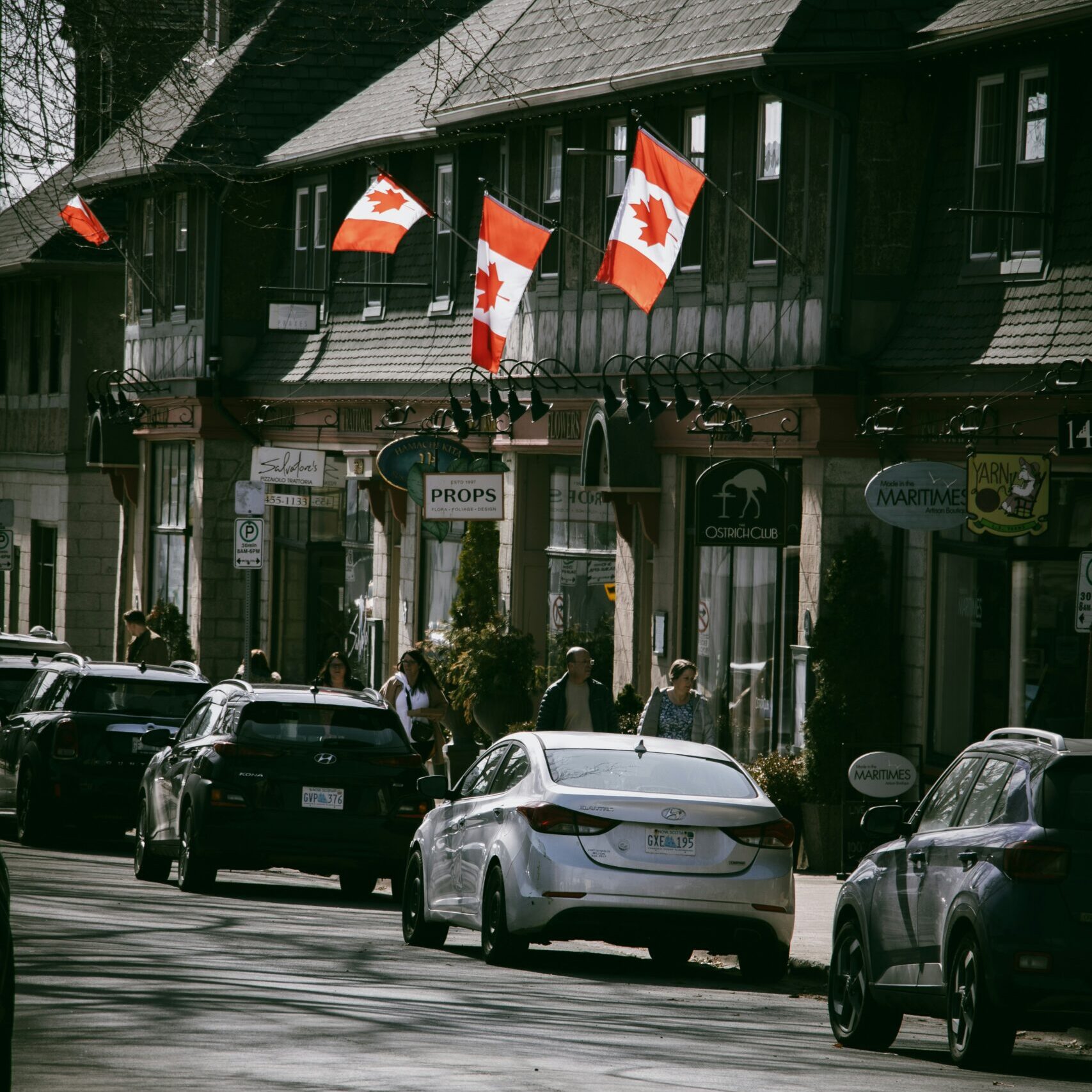By SCP Fellow Liliana Locke | Part of our Special Series: Always Canada. Never 51.
The Trump administration’s tariffs and threats are hurting many Canadian businesses. But there is an equally concerning threat closing main street doors and costing jobs: skyrocketing and unregulated commercial rent increases.
Business closures in Ontario increased by almost 10% between January 2023 and January 2024. I interviewed a dozen long-time business owners in Ontario who say they wouldn’t start their businesses here today if given the chance to begin again. These are skilled entrepreneurs, often running family businesses with decades of experience. The problem isn’t their business models or talent—it’s the mounting external pressures that make success so difficult.

While business costs are up across the board, one of the biggest pain points is commercial rent. According to a recent survey by the Better Way Alliance (BWA), a network of Canadian business owners that advocate for fair wages, reasonable work hours and equitable workplace conditions, 75 per cent of businesses that had renewed their commercial leases experienced a rent increase by double or triple digits.
According to the Toronto Regional Real Estate Board, retail rents in Toronto have risen by a whopping 128 per cent since 2020. In cities like Toronto, Vancouver and Waterloo, industrial rents have doubled over the past eight years and, in 2024, approximately half of businesses across Canada reported difficulty coping with rising occupancy costs.
Large commercial real estate landlords, and the global multinationals that can afford their storefront leases, are transforming our neighbourhoods in ways that undermine Canada’s economic resilience and economic sovereignty. We’ve all seen a new condo tower wipe out local shops and replace them with predictable pizza chains and cookie-cutter convenience stores–often owned by global firms or American investors.
When those local independent businesses close, we’re not just losing unique retail shops and services—we’re losing good jobs for local workers, wiping out retirement savings for long-time business owners and making it harder for new entrepreneurs to take the leap.
Contrary to some beliefs, a shortage of commercial real estate is not what’s behind the rising rents.
Often, big landlords have little incentive to negotiate fairly, because they’re willing to forgo rent payments today to hold out for a higher-paying tenant tomorrow—even if it means leaving storefronts vacant. For some commercial real estate investors, leaving the property empty and expecting appreciation in its value is a perfectly reasonable business strategy, even if it is bad for the community.
In Canada, commercial renters don’t have the same legal protections as residential tenants. Policymakers and the public both understand that if a business faces tariffs of 25%, they may not be able to survive. And yet provincial and territorial governments have been unwilling to step in to prohibit commercial rent increases of 25% or far more.
“Policymakers and the public both understand that if a business faces tariffs of 25%, they may not be able to survive. And yet provincial and territorial governments have been unwilling to step in to prohibit commercial rent increases of 25% or far more.”
The exploitation happens because it’s been allowed to happen. Commercial leases are not only not protected by province- or territory-wide rent control caps, but most jurisdictions don’t offer affordable dispute resolution: in Ontario, for instance, commercial landlords can evict a tenant only 16 days after rent is missed, effectively making it impossible to withhold rent if a landlord has failed to cover unexpected repairs or renovations.
There are jurisdictions that have solved for commercial rent hikes that we can learn from in this moment.
France caps commercial rent increases at 10 per cent between lease terms and prohibits tenants from paying for major repairs. Small retail tenants in Australia have access to mediation services for disputes. In New York, tax incentives encourage landlords to lease long-term to local businesses in order to create jobs and California recently adopted progressive legislation that caps rent increases for small brick-and-mortar businesses, while granting tenants additional protections.
In Vancouver, the New Westminster city council passed a motion in 2024 asking the province to explore commercial rent controls to help local businesses and Toronto City Council followed suit shortly after. Toronto voted almost unanimously for a motion that requested the Province of Ontario implement commercial rent reform and other legal protections for commercial tenants—unfortunately, for all its “Canada is not for sale” talk (and hats), the province has not yet moved on these small business protections.
Urgent, actionable changes to provincial and territorial commercial tenancies acts can level the playing field for Canadian small businesses under threat. These include:
Standardized commercial lease agreements, which help both parties understand their responsibilities and obligations.
A dispute resolution system to reduce legal fees and costly court delays.
Legal protection that allows businesses to withhold rent to offset money owed by a landlord—without fear of eviction.
Predictable rent increases through rent caps for commercial leases—similar to those in residential tenancy laws—which would provide business tenants with fair rent changes and the stability they need, while allowing landlords to remain profitable.
With commercial rent control, small businesses could focus on growing and investing in their businesses, rather than grappling with uncertain rent spikes. Especially right now, this kind of growth is crucial in fostering the wellbeing of local economies, protecting and generating Canadian jobs and keeping Canadian businesses locally owned.
A lack of commercial tenancy protections causes undue financial distress and threat of closure. Smart policy in the commercial rent market would provide Canada’s small businesses the vital opportunity to make the investments necessary to overcome this moment.
Canadians are seized with a commitment to buy locally. But many of our policy frameworks are crushing local small businesses, and the only ones that can afford rent are the big global chains. That is not good for the resilience of Canadian businesses or communities. It is also clearly not what Canadians want.
Share with a friend
Related reading
Market study submission: Competition in financing for Canada’s SMEs
Small- and medium-sized businesses (SMEs) face significant barriers to accessing capital and we believe that the lack of competition in the banking sector is one of several important contributing factors. We provided comment on the Competition Bureau's upcoming market study on SME financing because we believe that unlocking capital for SMEs and entrepreneurs will strengthen the Canadian economy, bolster our sovereignty and provide more Canadians with pathways to building wealth. We look forward to seeing how the evidence collected will help inform policymakers interested in tackling this issue.
Watch the video: Why would a company sell to its employees?
Canada is facing a $2-trillion business handoff. What if employees owned more of it? In this video, our Director of Policy Dan Skilleter explains why a company would sell to its own employees, how it happens and who stands to benefits. Spoiler alert: employee-owned companies are shown to be 8-12% more productive, share more wealth with their workers, keep businesses Canadian-owned and shore up the resilience of local communities and the broader economy.
How Canada can curb the serial acquisitions quietly reshaping our economy
In many cases, threats to the affordability of everyday goods and services are the byproduct of what competition experts call serial acquisitions—a pattern of larger firms buying up a series of smaller players to try and corner the market. As Michelle Arnold and Kiran Gill explain, a fair and competitive economy does not emerge by accident. The Competition Bureau's proposed Merger Enforcement Guidelines will play an important role in preventing bigger firms from creating unfair playing fields that hurt Canadian small businesses, workers and consumers. The next step for the bureau should be aggressive enforcement of the new guidelines.


